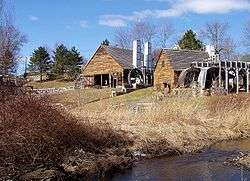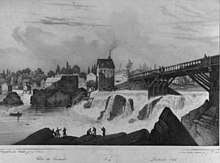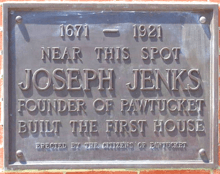Joseph Jenckes Jr.
Joseph Jenckes Jr. (baptized October 12, 1628 – January 4, 1717), also spelled Jencks and Jenks, was the founder of Pawtucket, Rhode Island, where he erected a forge in 1671.
Joseph Jenckes Jr. | |
|---|---|
| Baptized | October 12, 1628 Colnbrook, Middlesex, England |
| Died | January 4, 1717 (aged 88) |
| Other names | Jenks, Jencks (alt. spellings) |
| Occupation | Forge and sawmill owner |
| Known for | Founder of Pawtucket |
| Spouse(s) | Esther Ballard |
| Children | 9 |
| Parents |
|
After his mother and only sibling died in England, his father, Joseph Jenckes Sr., immigrated to New England. A few years later, in about 1647, Jenckes Jr. joined his father at his forge in Massachusetts Bay Colony and learned his father's trade. In 1660, Jenckes was jailed for treason, a charge that was later dropped.
Jenckes moved to the Colony of Rhode Island and Providence Plantations where he became a successful businessman. He served many years in the Rhode Island General Assembly and was elected Speaker of the House. His son, Joseph, became the colony's governor.
Early life

Joseph Jenckes Jr. was baptized October 12, 1628, in Colnbrook, Buckinghamshire, England. He was the eldest of two children born to Joseph Jenckes Sr. (1599–1683) and Joan Hearne (1607–1635).[1][2][lower-alpha 1]
In his youth he lived in Hounslow, Middlesex, where his father worked as a cutler in a sword factory. His mother died in 1635 and his only sibling, Elizabeth, died in 1638. About 1642, the widower Joseph Jenckes Sr. immigrated to New England and by 1645 he was working to establish an iron works, later called the Saugus Iron Works, at Hammersmith near Lynn in Massachusetts Bay Colony. By 1647, Jenckes Jr., who had remained in England, joined his father at the iron works.[3][4][5]
Imprisonment
Sometime before 1660, after working with his father at the Saugus Iron Works, Jenckes moved to Concord to work at an iron smelting operation. When he returned to Lynn it was alleged that he made treasonous remarks in a tavern against King Charles II of England. He was arrested, imprisoned, and during a hearing on April 1, 1660, the testimony of witnesses was entered into the record.[lower-alpha 2] Jenckes was accused by Nicholas Pinion of saying that "if he hade the King heir, he wold cutte of his head and make a football of it." He was accused by Thomas Tower of saying "I should rather that his head were as his father's[lower-alpha 3] rather than he should come to England to set up popery there."[2][6]
On May 22, 1661, the General Court of Massachusetts Bay Colony ruled in Jenckes's favor, citing his subsequent statement supporting the king. After a year of incarceration he apparently had a change of heart, so the charges were dropped and he was released.[7] The decision was recorded as follows:
Joseph Jencks, Juñ, being accused & bound ouer to this Court for high misdemeanor in diuers treasonable words agt the kings majty, wch, vpon examination, he vtterly disounes, neither doeth it appeare that the same cann be legally prooved ast him, only in part, for wch he presenteth & pleadeth the kings gracious act of indempnity, this Court therefore dischardgeth him from his imprisonm̃t.[8]
Forge and sawmill owner

Sometime between 1661 and 1669, Joseph Jenckes Jr. moved to the Colony of Rhode Island and Providence Plantations. In 1669, he was granted timbered land on both sides of the Pawtuxet River in Pawtuxet—then southern Providence—where he erected a sawmill. His grant required him to provide lumber and timber rights to the proprietors.[2][9]
In 1671, he moved to Pawtucket—then northern Providence—where he erected a forge and sawmill on the west side of present-day Blackstone River at Pawtucket Falls.[2][5] A ready supply of bog iron ore nearby attracted him to the area. Jenckes initially purchased 60 acres from Abel and Rachel Potter and he received more than 100 acres of the commons between 1674 and 1685.[10][11][12]
Jenckes's Pawtucket forge and home were burned down In 1676 during King Philip's War, which was the first major conflict between Native Americans and New England colonists. The residents received a warning before the attack and were able to escape. Later that year he returned to Pawtucket to rebuild his home and business.[2][9]
Pawtucket's founding

When Joseph Jenckes Jr. purchased land in 1671 at Pawtucket Falls on the west side of the Blackstone River, the village of Pawtucket did not yet exist. He was not the first landowner or settler in the area, however. Roger Williams had previously purchased the land in 1636 from the Narragansett people. When Jenckes arrived Ezekiel Holliman, Thomas Estance, John Smith, Gregory Dextor, Stukely Westcott, and Abel Potter had owned land while Richard Scott and Daniel Comstack had built homes. But it was not until Jenckes built his forge and sawmill at the falls that this sparsely populated area become a village and eventually a center for metalworks and other trades.[12]
Jenckes built his home and forge on the south side of today's Main Street at East Avenue in Pawtucket. The forge was situated near the present-day Main Street Bridge where the river drops 30 feet. The site of Jenckes's home is marked by a plaque on the Pawtucket Boys Club Building at 53 East Avenue.[13][14]
Jenckes's business led to "additional industrial development on both sides of the river, including sawmills, grist mills, oil mills, potash manufacture, and shipyards." Pawtucket was incorporated in 1823 and both sides of the river were combined into a single Rhode Island town in 1885.[14][15]
Public service
Jenckes was made a freeman (voting citizen) of the Colony of Rhode Island and Providence Plantations in 1677. He subsequently held several offices in the local and colonial governments. He was a member of the Providence Town Council, served as a moderator at town meetings, was a tax assessor, and performed marriages. In 1679, 1680, and 1691 he was elected deputy (town representative) to the colony's General Assembly. For thirteen years between 1680 and 1698 he was elected assistant (colonial representative) to the General Assembly. During his tenure in 1696, the General Assembly created two chambers: the House of Deputies (town representatives) and the Upper House (the governor, deputy governor, and assistants). Two years later he was elected Speaker of the House of Deputies—now Speaker of the House of Representatives—and was only the second person to hold that office.[2][16][17][18][19]
In 1690, Jenckes, along with six others, were selected to write an official communication on behalf of the colony to King William III and Queen Mary II congratulating them on their coronation and informing them of news in the colony. They informed the new monarchs that Sir Edmund Andros, the Governor of the Dominion of New England, had been arrested in the colony after a revolt against him in Boston.[16]
Family
Joseph Jenckes Jr. married Esther Ballard (1632–1717) in about 1655 at Lynn, Massachusetts Bay. She was the daughter of William and Elizabeth Ballard. The Ballard family had arrived in Boston in 1635 aboard the James sailing from London.[20]
The Jenckeses had nine children: Joseph, b. 1656; Elizabeth, b. 1658; Sarah, b. 1660; Nathaniel, b. 1662; Esther, b. 1664; Ebenezer, b. 1668; Joanna, b. 1672; William, b. 1674; and Abigail, b. 1676. Several of his children had distinguished careers: Joseph was the 19th governor of the Colony of Rhode Island and Providence Plantations, Ebenezer was an ordained minister at the First Baptist Church, and William was a judge and assemblyman.[21]
Death and legacy
Joseph Jenckes Jr. died January 4, 1717, in northern Providence, now Pawtucket.[9] Two Pawtucket schools were named in his honor. Joseph Jenks Jr. High School—a high school no longer operating—was built in 1896 at 300 Broadway.[22] Joseph Jenks Junior High School was opened in downtown Pawtucket in the 1920s and moved in the 1980s to 350 Division Street where it was renamed Joseph Jenks Middle School.[23] The street called Jenks Way in Pawtucket is near Pawtucket Falls.[24]
Notes
- Some sources incorrectly give Joseph Jenckes Jr.'s birth year as 1632.
- The quoted text includes original spelling and contractions.
- Charles I of England was beheaded.
References
Citations
- Browne & Colket 1956, pp. 4–6.
- Clapp 2002, p. 205.
- Browne & Colket 1956, pp. 4, 6, 9.
- Johnson & Brown 1904, p. 82.
- Jenks 1947, p. 119.
- Lewis & Newhall 1865, pp. 252–252.
- Newhall 1879, p. 421.
- Shurtleff 1854, pp. 7–8.
- Browne 1952, p. 3.
- Browne 1952, pp. 3–4, 6–9.
- Lewis & Newhall 1865, p. 15.
- Boucher 1976, p. 35.
- Pawtucket Preservation Society (Downtown), p. 1.
- National Park Service, p. 49.
- Addeman 1873, p. 87.
- Browne 1952, p. 4.
- Bicknell 1920, p. 604.
- Bunnelle 1998, p. 140.
- Addeman 1873, p. 105.
- Browne & Colket 1956, p. 6.
- Browne 1952, pp. 3, 13, 14–15.
- Pawtucket Preservation Society (Pleasant View), p. 4.
- Rhode Island Department of Education 2005, p. 4.
- Pawtucket Preservation Society (Downtown), p. 15.
Bibliography
- Addeman, Joshua M. (1873). Manual with Rules and Orders for the Use of the General Assembly of the State of Rhode Island 1872-73. Providence, RI: Providence Press Company.CS1 maint: ref=harv (link)
- Bicknell, Thomas Williams (1920). The History of the State of Rhode Island and Providence Plantations. American Historical Society.CS1 maint: ref=harv (link)
- Boucher, Susan Marie (1976). History of Pawtucket, 1635–1986. Pawtucket Public Library.CS1 maint: ref=harv (link)
- Browne, William Bradford (1952). Genealogy of the Jenks family of America. Concord, NH: Rumford Press.CS1 maint: ref=harv (link)
- Browne, William Bradford; Colket, Meredith Bright (1956). The Jenks family of England; supplement, compiled under the terms of the will of Harlan W. Jenks, deceased. Boston Public Library.CS1 maint: ref=harv (link)
- Bunnelle, Philip R. (1998). New England ancestry of George R. Perry, 1867–1947. Santa Clara, CA: P.R. Bunnelle.CS1 maint: ref=harv (link)
- BYU. "Exploring Relatives for Joseph Jenckes". www.relativefinder.org. Retrieved December 7, 2018.
- Clapp, George W. (2002). Ancestors and descendants of Harvey Towner and Caroline (Waterman) Cole of Williamstown, MA, 1810-1881. Barrington, RI: Presentation Press. ISBN 9780971898806.CS1 maint: ref=harv (link)
- Hall, Rich. "Famous Kin of Joseph Jenckes". famouskin.com. Retrieved December 7, 2018.
- Jenks, Albert Ernest (1947). "The British Wife of Joseph Jenks, the Patentee". Rhode Island History. VI: 118–127.CS1 maint: ref=harv (link)
- Johnson, Rossiter; Brown, John Howard (1904). The Twentieth Century Biographical Dictionary of Notable Americans. VI. Biographical Society.CS1 maint: ref=harv (link)
- Lewis, Alonzo; Newhall, James Robinson (1865). History of Lynn, Essex county, Massachusetts: including Lynnfield, Saugus, Swampscot, and Nahant. J.L. Shorey.CS1 maint: ref=harv (link)
- National Park Service. "National Register of Historic Places Registration Form" (PDF). www.preservation.ri.gov. Retrieved December 26, 2018.CS1 maint: ref=harv (link)
- Newhall, James Robinson (1879). Lin̄: Or, Notable People and Notable Things in the Early History of Lynn: The Third Plantation of Massachusetts Colony. G.C. Herbert.CS1 maint: ref=harv (link)
- Preservation Society of Pawtucket. "Pleasant View Neighborhood Tour" (PDF). www.pawtucketpreservation.org. Retrieved December 25, 2018.
- Preservation Society of Pawtucket. "Downtown Pawtucket Historic Walking Tour" (PDF). www.pawtucketpreservation.org. Retrieved December 25, 2018.
- Rhode Island Department of Education (2005). "Joseph Jenks Junior High School: The Salt Visit Team Report" (PDF). www.eride.ri.gov. Retrieved December 26, 2018.CS1 maint: ref=harv (link)
- Shurtleff, Nathaniel Bradstreet (1854). Records of the Governor and Company of the Massachusetts Bay in New England: 1661–1674. IV Part II. W. White, printer to the commonwealth.CS1 maint: ref=harv (link)

Further reading
- Carlson, Stephen P. (1978). Joseph Jenks, colonial toolmaker and inventor. Eastern National Park Monument Assoc.
- Roberts, Gary Boyd (1985). English origins of New England families: from the New England historical and genealogical register, second series. 2. Baltimore, MD: Genealogical Publishing Company. OCLC 11690506.
- William, Richard Cutter (1916). American Biography: A New Cyclopedia. 7. American Historical Society.
External links
- Pawtucket Falls Historical Marker at waymarking.com
- The Birth of American Industry: Why Pawtucket? at smallstatebighistory.com
- Joseph Jenckes Jr. at Find a Grave